Class 5X
In 1960, Headmaster Bill Gillion, with the co-opted help of Harry Smith, inaugurated a new form 5X. This was a special class was for the most gifted pupils of form 3A. It meant that the small group would study the fifth form syllabus, with the best available tutoring, in their fourth year to gain a year so that they would be able to study Open Scholarship, which went well beyond normal ‘A’ Level, in their year in the Upper Sixth rather than having to spend an addition year there.
The class was comprised of just twelve boys. Nine of the twelve gained places to Oxford or Cambridge Universities. To put this in context, Repton School achieved eight in the same year!
Sadly there was strong pressure, both internal and external, to look after the lesser able pupils rather than the brightest so the exercise was never repeated. Harry and other of the school’s most senior teachers saw this as the “start of the rot”.
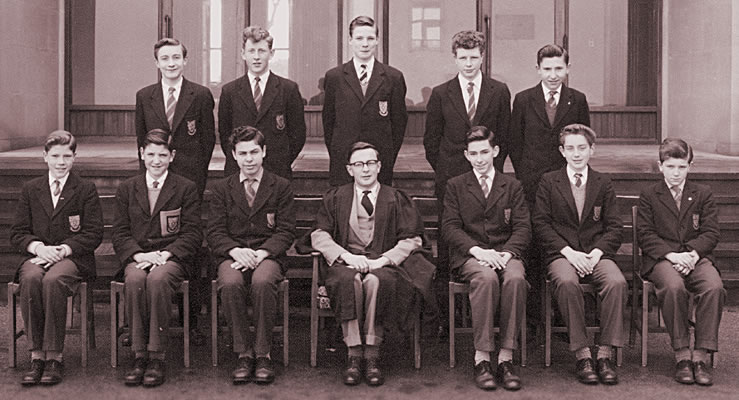
Christopher Tipper is the one pupil missing from the photo. It is thought that he went to Leeds University to he read Mathematics.
Top row from left to right:
Michael Green, studied Metallurgy at Oxford (New College) and now lives in the northern part of England. He visited classmate John Watson some time ago in Copenhagen in connection with some consultative work for IBM. He is still in contact with Roger Heape.
John Watson, studied Chemistry at Oxford (St. Edmund Hall), but converted to the computer industry and moved to Denmark for personal reasons in 1969. He has since worked for IBM for whom he has now worked for close to 40 years and still lives in Copenhagen with his wife Ida.
Roger Heape is considered a very central character. He was a fantastic DJ at John Watson’s 50th birthday in Copenhagen back in 1995 – his guests still talk about it, so many years after! Roger studied Geography at Cambridge (Pembroke College) and has had a lot to do with the Airlines business – BEA in the beginning and British Airways later on in a very top position. Roger has now retired and lives in Winchester together with his wife, Jenny.
Michael Hayton (aka Tudge) went to Cambridge (Churchill College) to study languages and went on to qualify as a Chartered Accountant.
David Allen was the only pupil in the class who did not go on to university.
Bottom Row from left to right:
Richard Inwood became Bishop of Bedford in 2003, however, he started his university career at Oxford (University College) studying Chemistry. (There are lots of web items to be found about Richard and some of them describe his career after Oxford).
Alan Stewart went to Oxford (St. Catherine’s College) and studied Metallurgy on an Exhibition Scholarship. He went on to do a PhD at Oxford before joining the CEGB (Central Electricity Generating Board as it was then).
Chris Howe went to Oxford (St. Edmund Hall) and also studied Metallurgy on an Exhibition Scholarship. He then went into the IT industry where he spent 20 years with ICL before retiring.
Arthur Presswell was the 5x form master and taught History. He did not spend long at the Grammar School and is thought to have come from Southend-on-Sea.
Alan Cooper went to Sheffield University and studied Geology. He also enjoyed an excellent Rugby Union career which included a number of England caps. He went to New Zealand to continue his studies. There, he went to Otago University. Despite not going to Oxbridge, he went on to become a professor (see http://www.otago.ac.nz/geology/afc.htm).
David Gooderick went to Cambridge (Emmanuel College) following which he did a teaching diploma at Oxford (Exter College) and went into teaching.
Chris Jeggo went to Oxford (St. Catherine’s College) on a Full Open Scholarship to study Physics. (articles on the web about him and contributed articles and photos to BGS). Chris moved into defence R&D in 1974 and has remained there ever since, working for a couple of different employers.
Teachers involved with 5x were:
English: Norman ‘Coddy’ Roe
French: Hugh Wood
Latin: Joseph ‘Jake’ Hammond
Spanish: (for the linguists): K.T. ‘Katie’ Harris
Maths: Harry ‘Brab’ Smith
Physics: Ezra Somekh
Chemistry: (for the scientists): Norman Jones
Geography: Ron ‘Ronnie’ Illingworth, and Geoffrey ‘Gaff’ Henton
History: Arthur ‘Elvis’ Presswell who also served as form master.
All pupils in 5x took at least eight ‘O’ levels.
Over 50 years later, a reunion lunch took place in Oxford with nine of the original members in attendance.


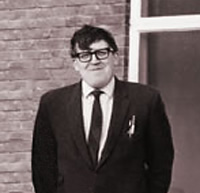 Brian Luckett was born in 1940 in London, and evacuated first to Newquay, Cornwall and then in 1944 to the very contrasting Colne in North East Lancashire. He was to remain in Lancashire and, during his teenage years, lived close to Pendle Hill where he attended Colne Grammar School. He was a very keen Burnley supporter at this time, always watching them play on a Saturday afternoon, often having played rugby in the morning at school. To this day, despite no longer being able to name any of the players, he finds himself habitually checking on Burnley’s results.
Brian Luckett was born in 1940 in London, and evacuated first to Newquay, Cornwall and then in 1944 to the very contrasting Colne in North East Lancashire. He was to remain in Lancashire and, during his teenage years, lived close to Pendle Hill where he attended Colne Grammar School. He was a very keen Burnley supporter at this time, always watching them play on a Saturday afternoon, often having played rugby in the morning at school. To this day, despite no longer being able to name any of the players, he finds himself habitually checking on Burnley’s results.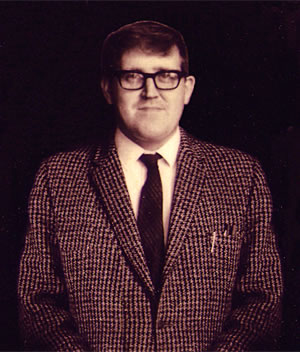 Brian obtained a BSc (Tech) degree in Textile Chemistry at the University of Manchester Institute of Science and Technology. At this time, the textile industry was going through a crisis and he decided to do a one year Postgraduate Certificate in Education at St. Luke’s College, Exeter. He had little chance of making the college rugby team though with the likes of Don Rutherford and Mike Davis (both future England captains) securing places. It was a much higher standard than the rugby he had enjoyed at school and university. His main teaching practice was at the Technical High School in Torquay.
Brian obtained a BSc (Tech) degree in Textile Chemistry at the University of Manchester Institute of Science and Technology. At this time, the textile industry was going through a crisis and he decided to do a one year Postgraduate Certificate in Education at St. Luke’s College, Exeter. He had little chance of making the college rugby team though with the likes of Don Rutherford and Mike Davis (both future England captains) securing places. It was a much higher standard than the rugby he had enjoyed at school and university. His main teaching practice was at the Technical High School in Torquay.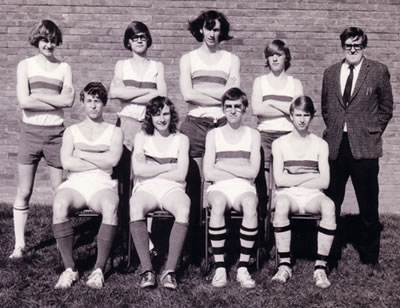 Shortly after starting, he was persuaded by Headmaster, Bill Gillion, to take charge of Cross Country. It was a burden he was never really happy with although he can recall many fond times with the likes of Peter Rose, Robert Barningham and David Van Der Merwe in the first eight. In particular, he remembers “a small spindly lad called Chadfield” being a superb terrier who joined the Royal Navy and was found to have TB. He could well have competed at international level had he been treated earlier.
Shortly after starting, he was persuaded by Headmaster, Bill Gillion, to take charge of Cross Country. It was a burden he was never really happy with although he can recall many fond times with the likes of Peter Rose, Robert Barningham and David Van Der Merwe in the first eight. In particular, he remembers “a small spindly lad called Chadfield” being a superb terrier who joined the Royal Navy and was found to have TB. He could well have competed at international level had he been treated earlier.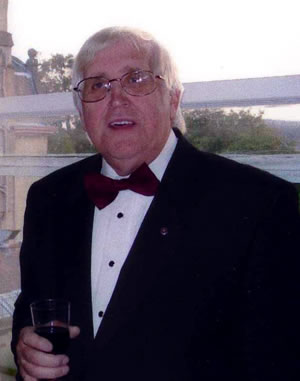 Brian was to remain there for fourteen years, before transferring to Wilmorton Tertiary College in 1989. He finally retired from teaching in 1995, but carried on marking ‘A’ Level Chemistry papers for the Cambridge Board for a further six years.
Brian was to remain there for fourteen years, before transferring to Wilmorton Tertiary College in 1989. He finally retired from teaching in 1995, but carried on marking ‘A’ Level Chemistry papers for the Cambridge Board for a further six years.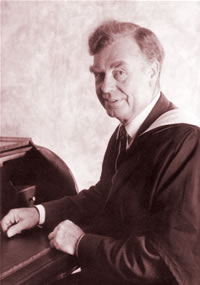 William H Gillion, more affectionately known as ‘Bill’, was educated at Paston Grammar School in Norfolk from where he was successful in gaining a place at Trinity College, Cambridge to read Mathematics. In 1934, he was awarded an Honours degree and he went on to gain an M.A.
William H Gillion, more affectionately known as ‘Bill’, was educated at Paston Grammar School in Norfolk from where he was successful in gaining a place at Trinity College, Cambridge to read Mathematics. In 1934, he was awarded an Honours degree and he went on to gain an M.A.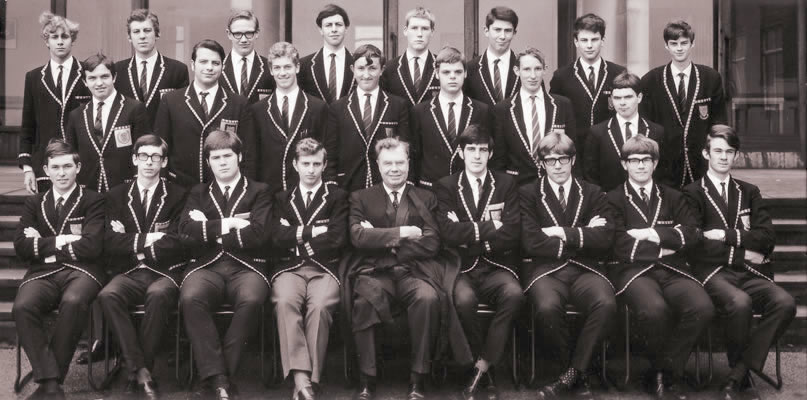 Mr Gillion was tremendously keen as far as academic standards were concerned, and the achievements of the school were never higher than under his headship. In 1960 William, with the co-opted help of Harry Smith, inaugurated a new form 5X. This was a special class that was for the most gifted pupils of form 3A. It meant that group of them would study the fifth form syllabus, with the best available tutoring, in their fourth year to gain a year so that they would be able to study Open Scholarship, which went well beyond normal ‘A’ Level, in their year in the Upper Sixth rather than having to spend an addition year there. Bill’s dream of academic excellence was realised; in a single year, Burton Grammar School achieved fourteen Scholarships and Exhibitions. To put this in context, Repton School achieved eight in the same year!
Mr Gillion was tremendously keen as far as academic standards were concerned, and the achievements of the school were never higher than under his headship. In 1960 William, with the co-opted help of Harry Smith, inaugurated a new form 5X. This was a special class that was for the most gifted pupils of form 3A. It meant that group of them would study the fifth form syllabus, with the best available tutoring, in their fourth year to gain a year so that they would be able to study Open Scholarship, which went well beyond normal ‘A’ Level, in their year in the Upper Sixth rather than having to spend an addition year there. Bill’s dream of academic excellence was realised; in a single year, Burton Grammar School achieved fourteen Scholarships and Exhibitions. To put this in context, Repton School achieved eight in the same year!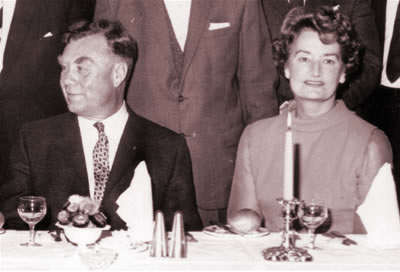 In 1975, two years after he left, the school closed, and was turned into the Abbot Beyne Comprehensive School’s Evershed building. You could almost say therefore, that his career at Burton Grammar School spanned the time of the beginning and the end of the Winshill school.
In 1975, two years after he left, the school closed, and was turned into the Abbot Beyne Comprehensive School’s Evershed building. You could almost say therefore, that his career at Burton Grammar School spanned the time of the beginning and the end of the Winshill school.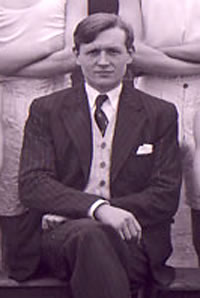 Victor was born in Rotherham, Yorkshire in 1925. He started his secondary education at Maltby Grammar School, one of whose most famous sporting pupils was Freddy Truman.
Victor was born in Rotherham, Yorkshire in 1925. He started his secondary education at Maltby Grammar School, one of whose most famous sporting pupils was Freddy Truman.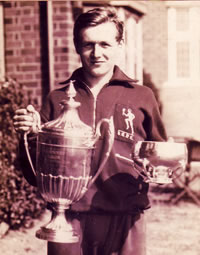 In 1942, he attended Loughborough College of Athletics that has produced many of England’s finest athletes the likes of Sebastian Coe, David Moorcroft and Sir Clive Woodward. In his first year, he won the coveted ‘Victor Ludorum Trophy’ (to save you rushing to Google to find out who Victor Ludorum was, as I did, it is in fact, Latin for “winner of the games”). It was the first time that this had been awarded to a middle-distance winner and Vic went on to win it the following; the first time that this had been achieved too. He also won the ‘Freshers Trophy’ for Athletics and Swimming combined. During this time, aside from athletics, he played for the college rugby team and was cross-country captain.
In 1942, he attended Loughborough College of Athletics that has produced many of England’s finest athletes the likes of Sebastian Coe, David Moorcroft and Sir Clive Woodward. In his first year, he won the coveted ‘Victor Ludorum Trophy’ (to save you rushing to Google to find out who Victor Ludorum was, as I did, it is in fact, Latin for “winner of the games”). It was the first time that this had been awarded to a middle-distance winner and Vic went on to win it the following; the first time that this had been achieved too. He also won the ‘Freshers Trophy’ for Athletics and Swimming combined. During this time, aside from athletics, he played for the college rugby team and was cross-country captain.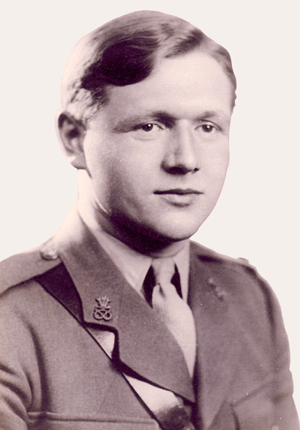 In 1944, his time at Loughborough was cut short with a one year deferment due to the war and was to join the Queens Regiment of the army in Maidstone, Kent. He was soon commissioned to the North Staffordshire Regiment and posted to Northern Italy where he was to patrol the Yugoslav border against gangs of Yugoslav partisans and escaped German prisoners of war. On conclusion of the war and before being demobbed in 1948, Vic played for the Central Mediterranean rugby and athletics team.
In 1944, his time at Loughborough was cut short with a one year deferment due to the war and was to join the Queens Regiment of the army in Maidstone, Kent. He was soon commissioned to the North Staffordshire Regiment and posted to Northern Italy where he was to patrol the Yugoslav border against gangs of Yugoslav partisans and escaped German prisoners of war. On conclusion of the war and before being demobbed in 1948, Vic played for the Central Mediterranean rugby and athletics team.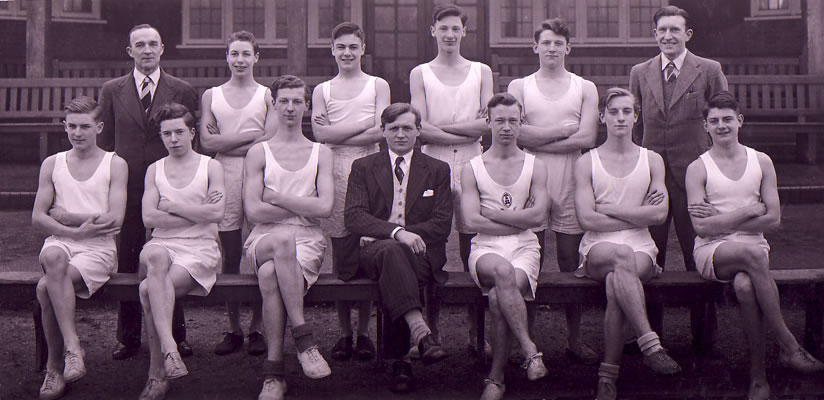 In January 1952, Victor joined Burton Grammar School, Bond Street as Head of Physical Education. Prior to this, the music teacher took PE and exercises were very basic. Immediately, circuit training was introduced with targets to reach bringing a whole dimension that had previously been lacking. Victor was also to develop the existing athletics, boxing, swimming, cricket, cross-country and rugby supporting Jake Hammond, Harry Smith, Jack Adams and Norman Jones. His weekends however, were taken with rugby where as flanker (wing forward in those days).
In January 1952, Victor joined Burton Grammar School, Bond Street as Head of Physical Education. Prior to this, the music teacher took PE and exercises were very basic. Immediately, circuit training was introduced with targets to reach bringing a whole dimension that had previously been lacking. Victor was also to develop the existing athletics, boxing, swimming, cricket, cross-country and rugby supporting Jake Hammond, Harry Smith, Jack Adams and Norman Jones. His weekends however, were taken with rugby where as flanker (wing forward in those days).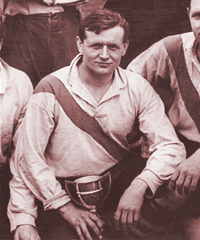 In 1972, Vic left Burton Grammar School and became ‘Secondary Schools Advisor’ for the country borough. Shortly after, he was one of the first four staff coaches for National Rugby Union. A year later, in 1973, Vic spent a few weeks rugby coaching in Poland where he was a little surprised to find that the sport had such a following there. He was later to also spend a short time coaching in Denmark.
In 1972, Vic left Burton Grammar School and became ‘Secondary Schools Advisor’ for the country borough. Shortly after, he was one of the first four staff coaches for National Rugby Union. A year later, in 1973, Vic spent a few weeks rugby coaching in Poland where he was a little surprised to find that the sport had such a following there. He was later to also spend a short time coaching in Denmark.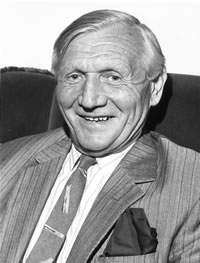 Among other sporting acknowledgements, Victor has been president of the Staffordshire Rugby Coaching Society where he gave practical help to both coaches and individual players; president of Burton Rugby Club as well as President of Staffordshire Rugby. He has also served as chairman of Burton Sports Advisory Council and chairman of Burton Rugby Club, where his membership now spans well over fifty years. There is now a suite named after him at Burton Rugby Club. Some PE teacher!
Among other sporting acknowledgements, Victor has been president of the Staffordshire Rugby Coaching Society where he gave practical help to both coaches and individual players; president of Burton Rugby Club as well as President of Staffordshire Rugby. He has also served as chairman of Burton Sports Advisory Council and chairman of Burton Rugby Club, where his membership now spans well over fifty years. There is now a suite named after him at Burton Rugby Club. Some PE teacher!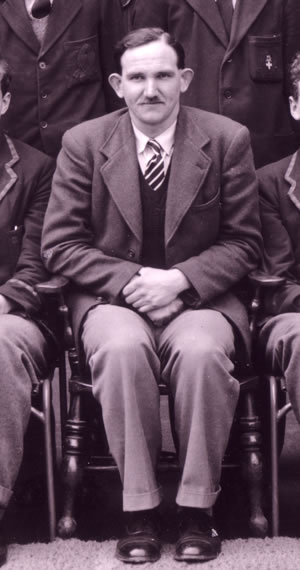 Harry Smith, affectionately known as ‘Brab’, was born in 1923 in Taunton, Somerset. His Grandfather was the pioneering founder of the Ramblers Autobus company which was to establish routes throughout the West Country. Harry’s father eventually took over the running of the company and they had sufficient means to send Harry to the well esteemed Taunton Public School. To this day, Harry can clearly remember the maths teacher, Mr John Evans, who was to have the strong influence on his life that Harry was himself going to eventually have on so many others.
Harry Smith, affectionately known as ‘Brab’, was born in 1923 in Taunton, Somerset. His Grandfather was the pioneering founder of the Ramblers Autobus company which was to establish routes throughout the West Country. Harry’s father eventually took over the running of the company and they had sufficient means to send Harry to the well esteemed Taunton Public School. To this day, Harry can clearly remember the maths teacher, Mr John Evans, who was to have the strong influence on his life that Harry was himself going to eventually have on so many others.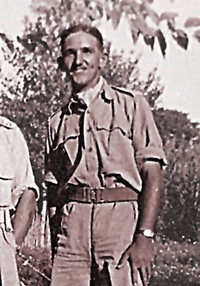 Towards the end of the war in 1945, Harry was made an Educational Officer and sent to Perugia College in Italy to re-educate troop in preparation for their return to normal life. By sheer co-incidence, he found himself teaching alongside his old Chemistry master from Taunton Public School.
Towards the end of the war in 1945, Harry was made an Educational Officer and sent to Perugia College in Italy to re-educate troop in preparation for their return to normal life. By sheer co-incidence, he found himself teaching alongside his old Chemistry master from Taunton Public School.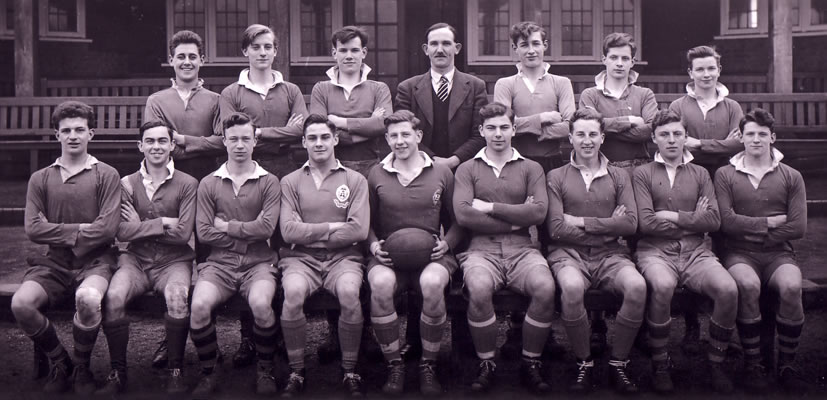 Harry put a great deal of time and effort into this and spent his Saturday mornings on the school rugby field. He was slightly perturbed to discover that Norman Jones received an additional allowance for his running of the Athletics whereas he received nothing. He took up the issue with the Headmaster, Mr Herbert (Horace) Pitchford, who had been appointed to replace Mr Moodey after is tragic recent death. Harry was declined which led to a feeling of resentment for which the school would pay dearly.
Harry put a great deal of time and effort into this and spent his Saturday mornings on the school rugby field. He was slightly perturbed to discover that Norman Jones received an additional allowance for his running of the Athletics whereas he received nothing. He took up the issue with the Headmaster, Mr Herbert (Horace) Pitchford, who had been appointed to replace Mr Moodey after is tragic recent death. Harry was declined which led to a feeling of resentment for which the school would pay dearly.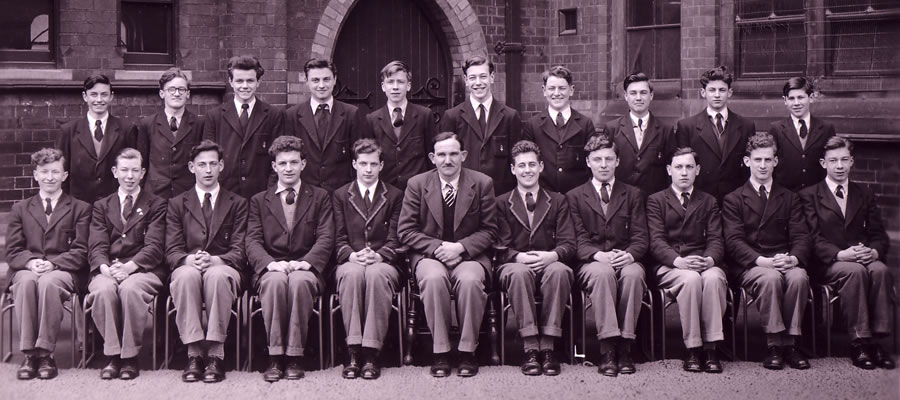 Shortly after the Winshill school was opened, William Gillion was appointed as Headmaster. Mr Gillion, himself a Cambridge Graduate of Mathematics, was a strong advocate of academic excellence and felt that the Mathematics Department at the school, then headed by George Cooper, did not offer provision for the most talented students. He was aware of Harry Smith and had received numerous accounts that he should never have been allowed to leave. So, in 1958, he wrote to Harry asking if we would consider taking over as Head of Mathematics and to run the Open Scholarships, which went beyond ‘A’ Level to prepare the most gifted students for places at Oxford, Cambridge and other Universities of Excellence.
Shortly after the Winshill school was opened, William Gillion was appointed as Headmaster. Mr Gillion, himself a Cambridge Graduate of Mathematics, was a strong advocate of academic excellence and felt that the Mathematics Department at the school, then headed by George Cooper, did not offer provision for the most talented students. He was aware of Harry Smith and had received numerous accounts that he should never have been allowed to leave. So, in 1958, he wrote to Harry asking if we would consider taking over as Head of Mathematics and to run the Open Scholarships, which went beyond ‘A’ Level to prepare the most gifted students for places at Oxford, Cambridge and other Universities of Excellence.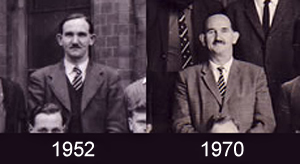 In 1960, Harry helped Bill Gillion to inaugurated a new form 5X to allow the most gifted pupils of form 3A to jump a year so that they would be able to study for Oxbridge entrance exams in their Upper Sixth without having to spend an addition year there. This proved to be tremendously successful and in their out-take year, the class achieved a record number of Oxbridge places, including Scholarships and Exhibitions, actually out-performing Repton Public School!
In 1960, Harry helped Bill Gillion to inaugurated a new form 5X to allow the most gifted pupils of form 3A to jump a year so that they would be able to study for Oxbridge entrance exams in their Upper Sixth without having to spend an addition year there. This proved to be tremendously successful and in their out-take year, the class achieved a record number of Oxbridge places, including Scholarships and Exhibitions, actually out-performing Repton Public School!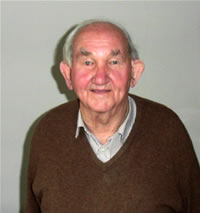 Harry’s time at the Grammar School also included the period where it was to be abolished in favour of becoming Abbot Beyne comprehensive school which led to much greater frustration. Harry himself sees this as “one of the greatest howlers the government has ever made”. His pleas for early retirement were declined so he was to continue at Abbot Beyne for a further three years by which time, he felt that we couldn’t have stood it for a moment longer.
Harry’s time at the Grammar School also included the period where it was to be abolished in favour of becoming Abbot Beyne comprehensive school which led to much greater frustration. Harry himself sees this as “one of the greatest howlers the government has ever made”. His pleas for early retirement were declined so he was to continue at Abbot Beyne for a further three years by which time, he felt that we couldn’t have stood it for a moment longer.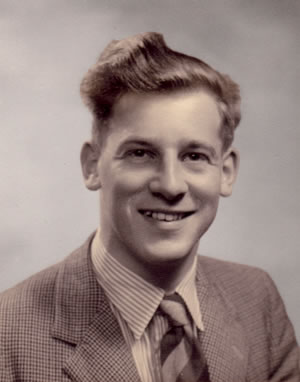 Geoffrey was born in Radcliffe-on-Trent, Nottinghamshire in 1928. He was educated at West Bridgford Grammar School from which he gained a place at Hull University College to take a London BA Honors in Geography from 1947 to 1950.
Geoffrey was born in Radcliffe-on-Trent, Nottinghamshire in 1928. He was educated at West Bridgford Grammar School from which he gained a place at Hull University College to take a London BA Honors in Geography from 1947 to 1950.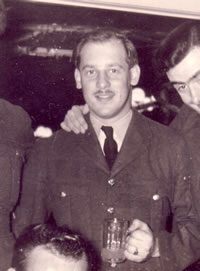 In 1953, Geoff and his now wife decided that they would like to move back to the Midlands somewhere near Burton or Nottingham.
In 1953, Geoff and his now wife decided that they would like to move back to the Midlands somewhere near Burton or Nottingham.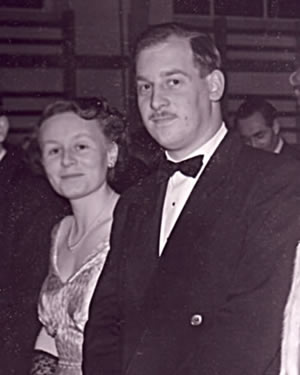 Having been pleased with Geoff’s performance, he was a natural successor so at the start of the following term, Mr Pitchford returned, Mr Cooper resumed to teach maths and Geoff Henton was permanently appointed as geography teacher. All could not have worked out better!
Having been pleased with Geoff’s performance, he was a natural successor so at the start of the following term, Mr Pitchford returned, Mr Cooper resumed to teach maths and Geoff Henton was permanently appointed as geography teacher. All could not have worked out better!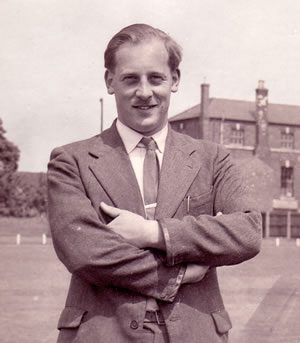 In 1968, George Cooper retired as Deputy Headmaster. At this time, Geoffrey was still second geography teacher under Ron Illingworth as Head of Geography. Harry Smith had not too long earlier returned to the Grammar School to take over the maths department. Although thought of as being the most likely candidate, Harry had made it plain that he had no interest in such a position wanting instead, to concentrate on mathematics and the open scholarships which were his passion. Speculation was that Mr Hugh Wood, Head of the languages department, would be likely to succeed above other heads of department. Nonetheless, Geoffrey decided to formally apply and was interviewed.
In 1968, George Cooper retired as Deputy Headmaster. At this time, Geoffrey was still second geography teacher under Ron Illingworth as Head of Geography. Harry Smith had not too long earlier returned to the Grammar School to take over the maths department. Although thought of as being the most likely candidate, Harry had made it plain that he had no interest in such a position wanting instead, to concentrate on mathematics and the open scholarships which were his passion. Speculation was that Mr Hugh Wood, Head of the languages department, would be likely to succeed above other heads of department. Nonetheless, Geoffrey decided to formally apply and was interviewed.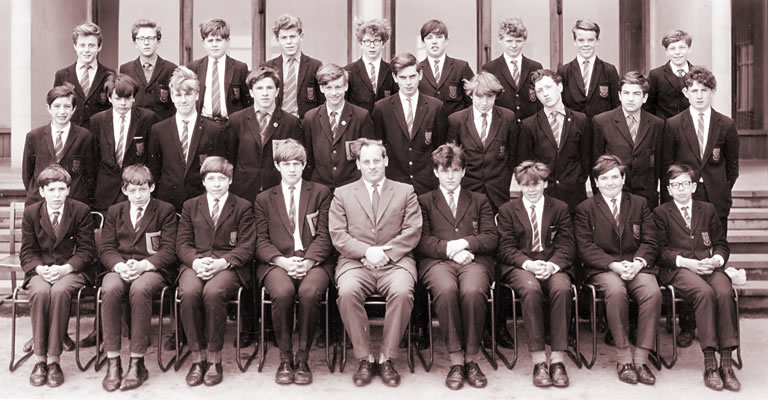 In 1973, William Gillion was to retire as Headmaster in the middle of the year due to external pressures and Geoffrey was appointed acting Headmaster for the remainder of the year until Brian Harris was instated, having been moved from Horninglow Secondary Modern School to oversee the ‘smooth’ transition from Grammar School to Comprehensive. At this point, Geoff reverted to Deputy Headmaster for what was probably going to be the most disruptive period in the school’s history. Geoffrey earned much respect in this period for his strong focus on making sure that the now mixed school students got the best possible education out of the situation as it now was without getting drawn into the politics of either side.
In 1973, William Gillion was to retire as Headmaster in the middle of the year due to external pressures and Geoffrey was appointed acting Headmaster for the remainder of the year until Brian Harris was instated, having been moved from Horninglow Secondary Modern School to oversee the ‘smooth’ transition from Grammar School to Comprehensive. At this point, Geoff reverted to Deputy Headmaster for what was probably going to be the most disruptive period in the school’s history. Geoffrey earned much respect in this period for his strong focus on making sure that the now mixed school students got the best possible education out of the situation as it now was without getting drawn into the politics of either side.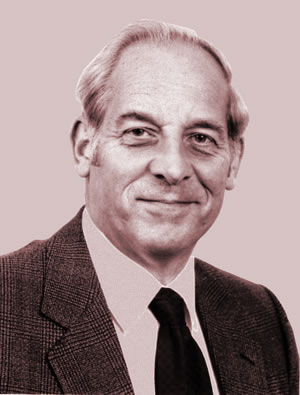 He continued as an effective Deputy Head and geography teacher until he was forced to take early retirement in 1984 due to poor health.
He continued as an effective Deputy Head and geography teacher until he was forced to take early retirement in 1984 due to poor health.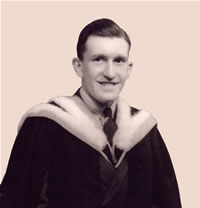 When he graduated three years later, the second world war was quite well advanced and Norman’s knowledge was put to use overseeing the production at the Government Explosives Establishment in Drigg, south of Whitehaven.
When he graduated three years later, the second world war was quite well advanced and Norman’s knowledge was put to use overseeing the production at the Government Explosives Establishment in Drigg, south of Whitehaven. 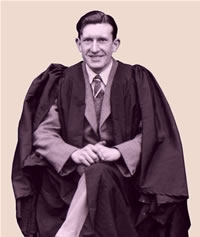 For the first years at Burton Grammar School, Norman lodged with the Binns family in Winshill. When his father began to suffer with his health, his parents moved from Manchester to Winshill and Norman moved in with them. Norman was though, soon to marry and move to Ashby Road where he was to remain for the rest of his life in a home still occupied by his wife, Sheila.
For the first years at Burton Grammar School, Norman lodged with the Binns family in Winshill. When his father began to suffer with his health, his parents moved from Manchester to Winshill and Norman moved in with them. Norman was though, soon to marry and move to Ashby Road where he was to remain for the rest of his life in a home still occupied by his wife, Sheila.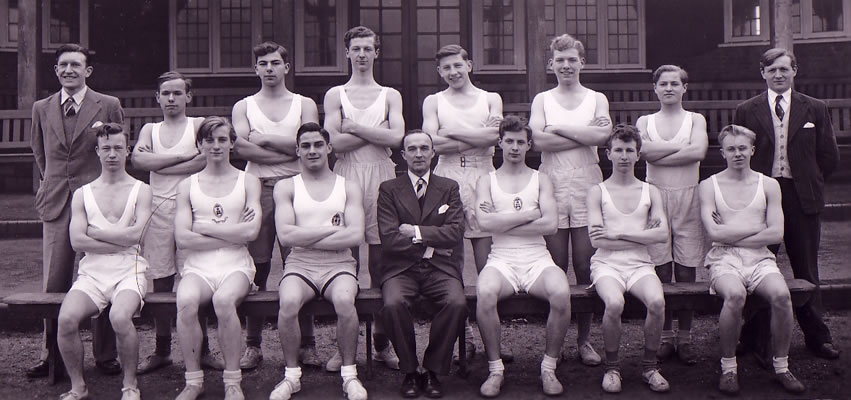 Norman was also heavily involved with school athletics in his early days, having earlier in his life been a promising sprinter. He working together with Victor Roebuck, the appointed PE (Physical Education) teacher, not knowing at this time that the two of them were destined to remain on the Grammar School teaching staff together for many decades to come.
Norman was also heavily involved with school athletics in his early days, having earlier in his life been a promising sprinter. He working together with Victor Roebuck, the appointed PE (Physical Education) teacher, not knowing at this time that the two of them were destined to remain on the Grammar School teaching staff together for many decades to come.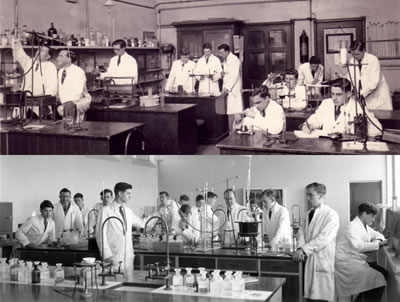 Norman taught at both Bond Street and Winshill and had considerable input into the design of the new laboratories. The original benches at Winshill proved to be too large and had to be hurriedly modified before school was back in session.
Norman taught at both Bond Street and Winshill and had considerable input into the design of the new laboratories. The original benches at Winshill proved to be too large and had to be hurriedly modified before school was back in session.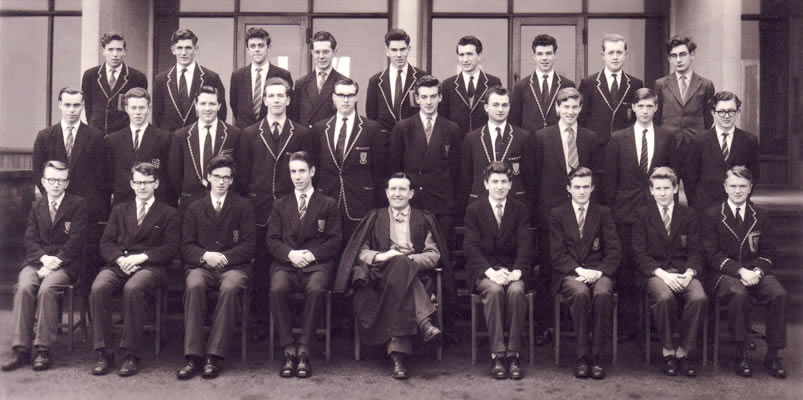 With many photographic slides of his travels, Norman presented a number of illustrative presentations to the Grammar School Sixth Form Society, as well as many outside groups and societies which were very much appreciated by those fortunate enough to attend. The experience had given Norman the yearning to travel and subsequently he became a very keen caravanner, travelling very extensively on the continent with his wife and young son during the long school holidays.
With many photographic slides of his travels, Norman presented a number of illustrative presentations to the Grammar School Sixth Form Society, as well as many outside groups and societies which were very much appreciated by those fortunate enough to attend. The experience had given Norman the yearning to travel and subsequently he became a very keen caravanner, travelling very extensively on the continent with his wife and young son during the long school holidays.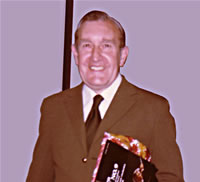 Norman requested early retirement and consequently retired in 1979. Post-retirement, Norman and Sheila led an active and enjoyable life together and made the most of their join love to travel. In what was to be his final year alone, he and his wife travelled to Spain, Africa, and South America. With only minor ailments, his death on June 10th, 2005 came as something of a sad surprise.
Norman requested early retirement and consequently retired in 1979. Post-retirement, Norman and Sheila led an active and enjoyable life together and made the most of their join love to travel. In what was to be his final year alone, he and his wife travelled to Spain, Africa, and South America. With only minor ailments, his death on June 10th, 2005 came as something of a sad surprise.